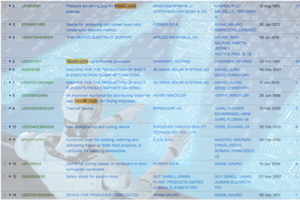New research project at MIPLM: AI-based third-party rights analysis for digital business models
This MIPLM thesis deals with the possibilities of using artificial intelligence for a freedom to operate analysis for patents in the field of digital business models. There is already a wide range of literature on artificial intelligence and digital business models. Digital business models are becoming increasingly important in the context of the digitalization of our society. This goes with IoT and Industry 4.0 and results in customer benefits that were not available before. This new trend in technology was also observed and accompanied by the patent offices. In the tools for classifying patent applications, space was created for “digital patents”. Examples for digital business models by means of digital patents are given in several Industry Case Studies on IP-Management by Prof. Dr. Alexander J. Wurzer.
To reduce the risk of an infringement a freedom to operate (FTO) analysis has to be performed for such new businesses. Part of such an FTO analysis, is a patent search to find out more about what is already protected by third parties. As someone can easily see, patent search is essential. With the quality of the patent search the FTO analysis stands and falls. The number of patent applications has risen sharply in recent years, so it is becoming more and more difficult for a searcher to deliver an adequate result in the mass of patents. An automated search by an AI would be very beneficial.
The use of AI has been intensively discussed and tested among patent experts for a few years and shows good results for the classification of patent applications in certain technical fields. WIPO for example started already in 2004 to develop an internal expertise in Natural language Processing and uses the IPCCAT-neural tool for classification. However, this can only be a first step, because the pure classification of a patent application is not comparable in its technological depth with the requirements for a search of a complete FTO analysis. It was for example shown that the quality of the classification based on AI is strongly dependent on the technical field. A unified terminology is essential.
One question that needs to be answered is how successful AI can be with digital patents. So to speak, is it simply possible to recognize digital business models or not? Case studies done by Prof. Dr. Alexander J. Wurzer for CLAAS, Hilti or Umdasch, for which digital patents have already been identified, served as an example. The frequency of technical terms used and overlaps in classifications were searched for. It was found that it is hardly possible to determine or assume such similarities in the cases considered. This was also shown by the fact that the class for business models was not regularly assigned. It appears that AI is at least not yet ready to perform good search results in the area of digital patents, at least for the reason that artisans don’t use a common technical vocabulary like it is common practice for example in chemistry.
This research project is conducted by MIPLM graduate Roland Bittner and supervised by Prof. Dr. Alexander Wurzer and Dr. Thibaud Lelong both CEIPI.
 Roland Bittner studied electrical engineering with emphasis on control engineering and communications engineering at the Friedrich-Alexander-Universität Erlangen-Nürnberg. He graduated with a diploma thesis about reactive power compensation in electrical power networks. Since then he is working for a large German technology and electrical engineering group. He started his career in the field of rolling mill technology and worked for it in Asia and North America. After that he worked in a service department for motion control products for machine tools and production machines. In 2000 he joined the patent department of the company and was trained as a German and European Patent Attorney. He was also trained in US patent law and passed the US patent bar. In 2019 he graduated from the University of Strasbourg, passing the CEIPI Master of Intellectual Property Law and Management.
Roland Bittner studied electrical engineering with emphasis on control engineering and communications engineering at the Friedrich-Alexander-Universität Erlangen-Nürnberg. He graduated with a diploma thesis about reactive power compensation in electrical power networks. Since then he is working for a large German technology and electrical engineering group. He started his career in the field of rolling mill technology and worked for it in Asia and North America. After that he worked in a service department for motion control products for machine tools and production machines. In 2000 he joined the patent department of the company and was trained as a German and European Patent Attorney. He was also trained in US patent law and passed the US patent bar. In 2019 he graduated from the University of Strasbourg, passing the CEIPI Master of Intellectual Property Law and Management.
Here is a description of the research project: Potentials of AI-based third-party rights analyses for digital business models.



